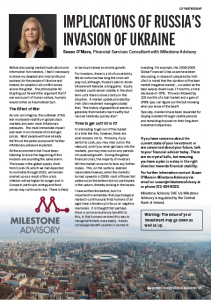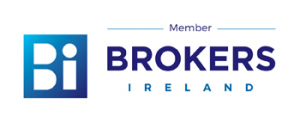In this month’s Construction Magazine, Susan reflects on the impact of the Russian invasion of Ukraine.
Before discussing market implications and information for investors, I feel it necessary to share my deepest and most profound sadness for the people of Ukraine and indeed, for people in all conflict zones across the globe. The philosopher AC Grayling put forward the argument that if war was a part of human nature, humans would not be so traumatised by it.
The Effect of War
 As one can imagine, the outbreak of this war increased volatility in global stock markets and even more inflationary pressures. The most immediate impact was seen in an increase of oil and gas prices. Most people will have already felt this at the petrol pumps with further inflationary pressure expected.
As one can imagine, the outbreak of this war increased volatility in global stock markets and even more inflationary pressures. The most immediate impact was seen in an increase of oil and gas prices. Most people will have already felt this at the petrol pumps with further inflationary pressure expected.
All the economists that I have been listening to since the beginning of this invasion are sounding the same alarm. The issues in the global supply chain from Covid-19, which we had expected to normalise through 2022, will remain snarled up as a result of this crisis. Inflation will be higher for longer and in Europe in particular, energy and food prices may continue to rise. There is likely to be much slower economic growth.
For investors, there is a lot of uncertainty. We do not know how long the crisis will play out, although, Russia’s plan to annex Ukraine will likely be a long game. Equity markets could remain volatile in the short term until there is more clarity on this situation. A market update provided by Irish Life investment managers stated that, “the history of geopolitical events is generally that markets react swiftly but recover relatively quickly also”.
Time to get out? Or is it?
It is tempting to get out of the market at a time like this, however, there are solid reasons not to. Primarily, if you switch to cash, you may miss out on the rebound, and if you never get back into the markets, you may miss out on any periods of sustained growth. During the global financial crisis, the majority of investors left the market so as not to face any further losses. This, on the surface, seemed reasonable however, when the markets turned upwards in 2009, most of those that opted out at the bottom did not participate in the upturn, thereby locking in the losses.
I have written about this before, but it is important to remember that psychological research continuously finds humans of all ages have a tendency to focus on negative memories. It is thought that perhaps there is some evolutionary benefits to this, in that humans evolved this way to recognise threats more easily. It does not always benefit us when it comes to investing. For example, the 2008-2009 Global Financial Crisis as we have been discussing, in research prepared by Irish Life it is noted that the duration of the bear market (negative market – so called as the bear swipes down!) was 17 months, a total decrease of -57%. This was followed by 129 months of a bull market and a gain of 378% (you can figure out the bull knowing what you know of the bear!).
Typically, investors have been rewarded for staying invested through volatile periods and remaining focused on their long-term investment objectives.
If you have concerns about the current state of your investment or are concerned about your future, talk to your financial adviser today. There are no crystal balls, but ensuring you have a plan is a step in the right direction towards financial stability.
For further information, contact Susan O’Mara in Milestone Advisory via email (susan@milestoneadvisory.ie), or phone (01) 406 8020.
 Here to help you navigate your way to financial security.
Here to help you navigate your way to financial security.
The Milestone Advisory team are qualified financial services consultants. We specialise in helping professionals in the construction sector and related industries. Our team will work with you to review your finances, explaining your options in clear English.
No jargon – just the facts.
Milestone Advisory DAC t/a Milestone Advisory is regulated by the Central Bank of Ireland.
Warning: The value of your investment may go down as well as up.





